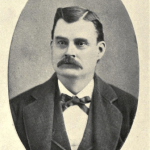
The manifestation of superior business talent at an early age is always a good sign. It usually marks a young man who will care less for pleasure than work, who will keep trying and will try intelligently, and who is pretty apt to come out strong financially sooner or later. The career of the late Thomas Crane, of Soda Springs, Idaho, was an illustration of these claims. He began early and endeavored always; he despised not the day of small things, and he died successful and honored.
Thomas Crane was born in Canada, July 4, 1843, and died at Soda Springs, Idaho, May 15, 1896. His parents, who were natives of New Jersey, had taken up farming in Canada. His father, Isaac Crane, died in the prime of life, and the widowed mother removed with her children to Michigan, where she died in 1899, aged eighty-six. Of their family of nine children Thomas was the sixth in order of birth. He attended the public schools near his home in Canada and made good progress with his books. When but a boy of seventeen, he demonstrated his possession of extraordinary business talent by establishing a match factory, in which he employed several men. Information is wanting as to how this enterprise terminated, but it is safe to state that it was not a failure. After some years of business experience as traveler for a wholesale drug house, in Canada, he went to Oregon in 1863, being then only twenty years old. For some years he mined in that state and in British Columbia, with the fluctuating fortune peculiar to mining, making money and sinking it and making more and sinking that. Then he made some money in the Carriboo mines, and not taking another chance of sinking it, bought, with part of it, a stock of general merchandise at Soda Springs. When he opened his store he had no idea of remaining at Soda Springs longer than might be necessary to sell his stock, but he made money and his honorable methods pleased his patrons and laid a safe foundation for greater operations, and he staid and became the largest merchant and wealthiest man in the place, with money invested in bank stock, and other money which he profitably loaned. In 1885 he built a good store building, in which his mercantile business is continued successfully by his widow, and later he bought a fine residence, which has since been the family home.
Mr. Crane was early married, and his wife died, leaving him one son, Eugene Crane, now a resident of Detroit, Michigan. In August 1871, he married Miss Flora Goodwin. They had eight children, five of whom are living: Bert, Elliott, Albert J., Robert Roy and Elva Teck. The youngest of the family, Flora Cuba, who was but three months old when Mr. Crane died, died in 1898, only about two years later, and the family feel a sense of double bereavement. Mr. Crane gave close attention to his business and took little active interest in politics, but at all times did everything in his power to promote the welfare of his adopted town and its people. His loss to the community is one not easily repaired.
Mr. Crane was a member of the Independent Order of Odd Fellows in Canada. In the management of his estate and mercantile business, Mrs. Crane has developed unusual business ability. She is bending all her energies to the successful realization of her late husband’s plans and to the education and establishment of her children in life.
